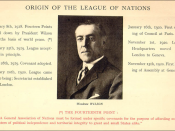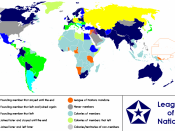The League of Nations, established in 1921, was the brainchild of Thomas Woodrow Wilson, president of the United States during World War 1. The idea was conceived during the advent of the "Great War", and aimed to stop war through working together, improve people's lives, fight disease and slavery, help workers, and disarm the world. Although the League of Nations was successful in some of its endeavours to maintain world peace and harmony, the majority of their attempts at creating a new world order were not successful. The League of Nations was doomed to fail from the very beginning of its establishment.
One of the main reasons why the League of Nations could not succeed in its aims of global harmony was the fact that the country that first proposed the idea of the organisation did not join in the end. The U.S. Senate forbade America from joining on the grounds that they did not want to forsake national sovereignty, they didn't want to police the world, and many German-Americans, a significant percentage of the population at the time, resisted the idea of the States as a League of Nations member because of their indignance with the US' role in the Treaty of Versailles.
Because the US did not join the League of Nations, the League lost much credibility in the eyes of other nations. Furthermore, the US was a trusted nation because of its relative newness and apparent flexibility, and the loss of them as a mediator was a blow to the League's effectiveness in negotiations with other countries. Nations would have trusted the League more if the US was part of it, as other countries leading the League were considered to be only looking out for their own interests, and the US did not have...


